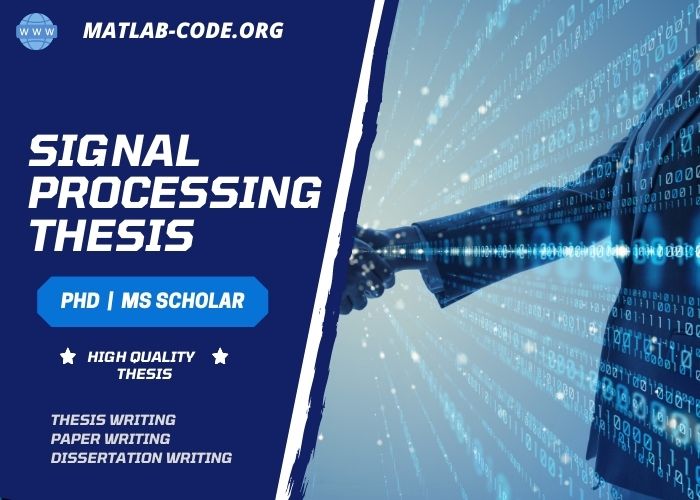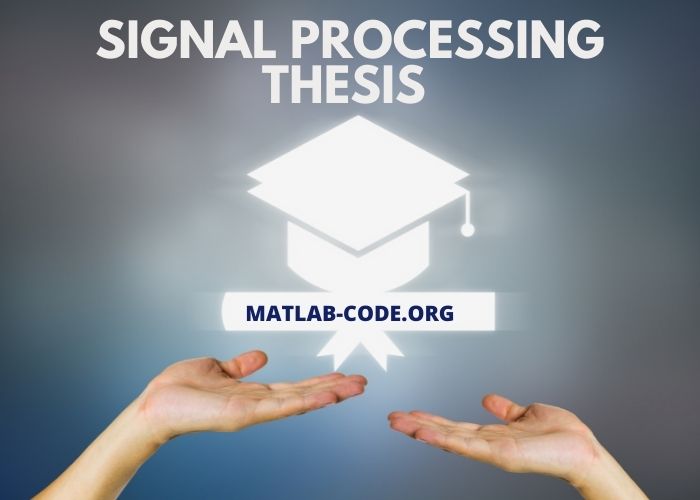This page is a great resource to understand signal processing concepts, and to build your research signal processing thesis. We guide PhD & MS Scholars to implement their research work with our expert guidance. Signal processing is the process of analysing bio-signals for the extraction of meaningful information for diagnostic / analysis purposes. With an intention to improve the diagnosis capacity, this technique was launched. Specifically, it thoroughly examines the patient’s biological phenomena to figure out the major disorders with their severity.
This article clearly describes the signal processing thesis guidance and its importance, recent and future research directions!!!
Generally, signals are known as information carriers with meaningful and undesirable data. To improve signal interpretation, we perform several operations such as noise reduction, feature extraction, enhancement, transmission, and storage at different levels. Due to these benefits, this field gains the attention of many scholars. Hence, scholars are demanding current Signal Processing Thesis topics to begin their research.
We have an infinite number of thesis ideas in the biomedical signal processing research field with an aim to use abstract information from bio-signals. Further, we also help you develop different signal processing techniques that are unique from others. The following are two main processes involved in signal processing.
Important Two Tasks in Signal Processing
- Signal Filtering
- Signal-in-Signal-Out (SISO) method for processing the signal
- Reduce the interference and noise
- Based on the band, split the frequency into different range
- Signal Analysis
- Evaluate the signal based on its own attributes such as modulation, time, amplitude, phase, etc.
- Analyze both the frequency and phase domain spectrum
- Identify, detect, test and classify the target
We assure you that we answer the following research questions in your handpicked Signal Processing Thesis topic since these questions are more important to elevate your research work from others.
- What are the methods involved in tackling the research problem in signal processing?
- Which method gain more attention due to their unique problem solving capability?
- How the signal processing system is constructed and what are entities are used?
What are the Biomedical Signals?
Most importantly, the biomedical signal processing system concentrates on information reciprocation in the analyzing and assessing of the signals. It has the motive to bring advanced developments in biological science and clinical medicine fields. In this fields, the biomedical signals are signified into several forms, and some of them are given below,
- Electrooculogram (EOG)
- Electroenceophalogram (EEG)
- Electromyogram (EMG)
- Electrocardiogram (ECG)
- Electrocorticogram (ECoG)
Due to the intensive output data of biomedical experimentations, biosignal operations like classification, extraction, etc., are quite difficult to perform. So, our Signal Processing Thesis topics surely address these issues and propose the best alternative solutions to improve the input and output storage.
Signal Processing Algorithms
The signal processing system has several phases of development such as preprocessing, selection of feature, extraction of feature, classification, and post-processing. Each phase has unique characteristics and purposes for performing important operations. So, “N” number of techniques and algorithms are proposed for each phase. For your information, we have listed out some important methods that followed in every process.

Preprocessing Methods in DSP
- Singular Value Decomposition
- Kalman Filter
- Sparse PCA
- Local Averaging
- Neuron Ranking Functions
- Frequency Normalization
- Spike Detection Functions
- Weiner Filter
- Maximum Noise Method
- Common Spatial Subspace Decomposition
Feature Extraction / Selection Methods in DSP
- LDA
- Relief Method
- Genetic Algorithm
- Stepwise Discriminant Procedure
- Zero-norm Optimization
- Principal Component Analysis
- Fisher Criterion (Feature Selection)
- Grid Search Method
- Sequential Forward Feature Selection
- Fisher Discriminant (Dimensionality Reduction)
- Orthogonal Least Square (based on RBF)
- SVM based Recursive Feature Elimination
Feature Classification Algorithms in DSP
- Sparse FLD
- ZDA
- Bayes Quadratic Classifier
- LDS
- Time-wraping based Linear Classifier
- Nonlinear Discriminant Function
- Logistic Regression
- Mahalanobis Distance-based Classifier
- SSP
- Linear Classifier
- Single Layer Perception
- 2D Linear Classifier
- SOM-based SSP
- Bayesian Classifier (linear classifier)
- Linear Bayian Decision Rule
- Gaussian Classifier
Further, we also support you in other techniques of digital signal processing. And, they are multiplexing, synchronization, beamforming, initial access, and channel tracking. Based on the selection of the Signal Processing Thesis topic, the algorithms may vary. Our experts will assist you in choosing the appropriate solutions.
Research Topics in Signal Processing
- Digital Signal Processor (DSP) Architecture
- Advance DSP architectures
- Assembly Language
- Real-Time Computing System
- DSP Interfacing Techniques
- Harvard Architecture (Pipeline Arrangement)
- Special Addressing Modes (Direct, Indirect and Immediate)
- Digital Communication Algorithms / Applications
- Pseudo Noise Sequence Generator
- Pulse Shaping Design and Filter
- Demodulation and Modulation Techniques for Digital
- Demodulation and Modulation Techniques for Analog
- Wireless LAN and ADSL system for Multicarrier modulation
- Digital Signal Processing Algorithms / Applications
- Quantization in Digital Communication
- Frequency Response and Analysis of Signals
- A/D and D/A Data Convertors
- Digital Filter Transfer Functions
- Quantization Noise Shaping and Oversampling
- High-Order Filtering and Sampling of Signals
How to Process or Implement any concept?
For processing the concept, first, you need to analyze the related papers for getting a new idea on proposing the problem-solving solutions. Next, for implementing the concept, you need to select the best-fitting development tools and technologies. We have well-established bio-engineers to help you in these two aspects. For your information, here we have given a list of tools that are best to implement your signal processing projects.
Tools and Simulators for Signal Processing
SCIPY
- Opensoure python assisted library
- Support numerical computing (scientific engineering)
- Build with massive modulre and in specific Nerokit performs biosignal processes
- Provide precise biosignal channels
- Easy to work with real-world medical applications
- For instance: Monitoring Heart rate variations by ECG Signal quality
OCTAVE
- Batch based high-level language
- Provide Command Line Interface (CLI)
- Simple to work with numerical operations (linear and non-linear)
- Easy to import BioSig library (package: biosig4octmat) for analyzing biosignals
OCTAVE STFT
- In OCTAVE, it computes STFT values which is a Fourier-based transform
- STFT is used to determine the sinusoidal frequency and create the local sections in a signal which frequently changes throughout the process.
- Further, it enables the connection of space with wavelets, constant-Q and STFT transform.
- Easy to develop the bio-signal processing applications
MATLAB
- Programming language and mathematical framework
- Support data-intensive biosignal application design and simulations
- For instance: When dealing with ECG signal, first extract the S-T and compute the curved lines in T-waves. Then, detect the disease type
In general, the data-intensive application may face many complexities like time-consuming while modeling, computing and simulating. To overcome those complexities, Simulink offers a new feature called the dataflow domain. By the by, it makes the partition model perform parallel by using any of the following data-task parallelism combos,
- Unfolding parallelism – function with successive frames in the data stream through the same set of rules
- Pipelining parallelism – function with various portions in the same data through diverse set of rules
- Explicit parallelism – function with multiple data sets by various set of rules
The above-mentioned tools are very useful in developing your desirable research topic. Further, these tools help you to design a user-friendly interface for performing biomedical engineering processes. And also, we have a team of experts with sufficient knowledge to practically implement your topic. So, we will assist you in selecting the appropriate implementation tool by specifying the features and suitability of the technologies.
Similar to research and development, we also help you in thesis writing. We have a native writer team to support you in this phase. They are highly professional in converting practical research into a chain of valuable words that deliver your incredible ability to perform research in signal processing. Below, we have given how we collect, study, and process your handpicked research topic.

Signal Processing Thesis Writing Procedure
- Step 1: Identify your area of interest
- Step 2: Based on your demand, we give you practicability of 5 titles
- Step 3: Have gentle discussion on those topics
- Step 4: Get the acceptance from you on any one topic
- Step 5: Undergo thorough survey on 40+ related papers from reputed journal
- Step 6: Analyze both advantages and drawbacks on those papers
- Step 7: After the comprehensive study, then narrow the topic to specific idea
- Step 8: Again, get the acceptance from you on handpicked idea
- Step 9: Implement the idea through appropriate development tool and technology
- Step 10: Collect the general thesis structure that confirmed by your university
- Step 11: Completion and delivery of the thesis
Further, if you are looking for excellent research and development guidance in the field of Signal Processing Thesis, then contact our team.





